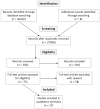Impact of clinical registries on quality of patient care and clinical outcomes: A systematic review
- PMID: 28886607
- PMCID: PMC5591016
- DOI: 10.1371/journal.pone.0183667
Impact of clinical registries on quality of patient care and clinical outcomes: A systematic review
Abstract
Background: Clinical quality registries (CQRs) are playing an increasingly important role in improving health outcomes and reducing health care costs. CQRs are established with the purpose of monitoring quality of care, providing feedback, benchmarking performance, describing pattern of treatment, reducing variation and as a tool for conducting research.
Objectives: To synthesise the impact of clinical quality registries (CQRs) as an 'intervention' on (I) mortality/survival; (II) measures of outcome that reflect a process or outcome of health care; (III) health care utilisation; and (IV) healthcare-related costs.
Methods: The following electronic databases were searched: MEDLINE, EMBASE, CENTRAL, CINAHL and Google Scholar. In addition, a review of the grey literature and a reference check of citations and reference lists within articles was undertaken to identify relevant studies in English covering the period January 1980 to December 2016. The PRISMA-P methodology, checklist and standard search strategy using pre-defined inclusion and exclusion criteria and structured data extraction tools were used. Data on study design and methods, participant characteristics attributes of included registries and impact of the registry on outcome measures and/or processes of care were extracted.
Results: We identified 30102 abstracts from which 75 full text articles were assessed and finally 17 articles were selected for synthesis. Out of 17 studies, six focused on diabetes care, two on cardiac diseases, two on lung diseases and others on organ transplantations, rheumatoid arthritis, ulcer healing, surgical complications and kidney disease. The majority of studies were "before after" design (#11) followed by cohort design (#2), randomised controlled trial (#2), experimental non randomised study and one cross sectional comparison. The measures of impact of registries were multifarious and included change in processes of care, quality of care, treatment outcomes, adherence to guidelines and survival. Sixteen of 17 studies demonstrated positive findings in their outcomes after implementation of the registry.
Conclusions: Despite the large number of published articles using data derived from CQRs, few have rigorously evaluated the impact of the registry as an intervention on improving health outcomes. Those that have evaluated this impact have mostly found a positive impact on healthcare processes and outcomes.
Trial registration: PROSPERO CRD42015017319.
Conflict of interest statement
Figures
References
-
- Gliklich RE, Dreyer NA, Leavy MB. Registries for evaluating patient outcomes: a user’s guide. 3rd ed: Agency for Health Care Research and Quality; 2014. - PubMed
-
- Dokholyan RS, Muhlbaier LH, Falletta JM, Jacobs JP, Shahian D, Haan CK, et al. Regulatory and ethical considerations for linking clinical and administrative databases. American heart journal. 2009;157(6):971–82. doi: 10.1016/j.ahj.2009.03.023 - DOI - PubMed
-
- Peterson ED, Shah BR, Parsons L, Pollack CV, French WJ, Canto JG, et al. Trends in quality of care for patients with acute myocardial infarction in the National Registry of Myocardial Infarction from 1990 to 2006. American heart journal. 2008;156(6):1045–55. doi: 10.1016/j.ahj.2008.07.028 - DOI - PubMed
-
- LIM TO, Goh A, LIM YN, Morad Z. Review article: Use of renal registry data for research, health-care planning and quality improvement: What can we learn from registry data in the Asia—Pacific region? Nephrology. 2008;13(8):745–52. doi: 10.1111/j.1440-1797.2008.01044.x - DOI - PubMed
Publication types
MeSH terms
LinkOut - more resources
Full Text Sources
Other Literature Sources


